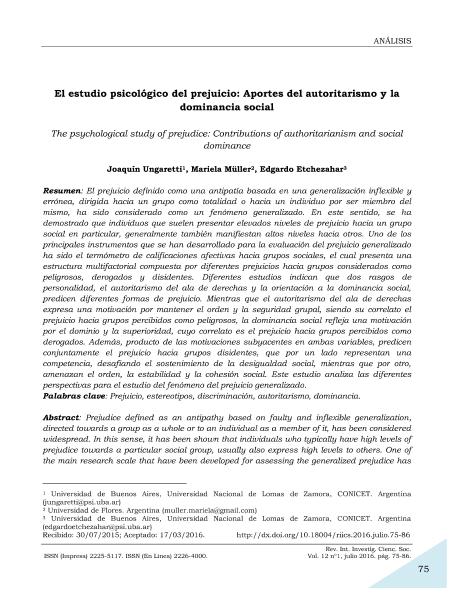Mostrar el registro sencillo del ítem
dc.contributor.author
Ungaretti, Joaquín

dc.contributor.author
Müller, Mariela
dc.contributor.author
Etchezahar, Edgardo Daniel

dc.date.available
2020-08-05T12:11:12Z
dc.date.issued
2016-07
dc.identifier.citation
Ungaretti, Joaquín; Müller, Mariela; Etchezahar, Edgardo Daniel; El estudio psicológico del prejuicio: Aportes del autoritarismo y la dominancia social; Universidad Autónoma de Asunción; Revista Internacional de Investigación en Ciencias Sociales; 12; 1; 7-2016; 75-86
dc.identifier.issn
2225-5117
dc.identifier.uri
http://hdl.handle.net/11336/110875
dc.description.abstract
El prejuicio definido como una antipatía basada en una generalización inflexible y errónea, dirigida hacia un grupo como totalidad o hacia un individuo por ser miembro del mismo, ha sido considerado como un fenómeno generalizado. En este sentido, se ha demostrado que individuos que suelen presentar elevados niveles de prejuicio hacia un grupo social en particular, generalmente también manifiestan altos niveles hacia otros. Uno de los principales instrumentos que se han desarrollado para la evaluación del prejuicio generalizado ha sido el termómetro de calificaciones afectivas hacia grupos sociales, el cual presenta una estructura multifactorial compuesta por diferentes prejuicios hacia grupos considerados como peligrosos, derogados y disidentes. Diferentes estudios indican que dos rasgos de personalidad, el autoritarismo del ala de derechas y la orientación a la dominancia social, predicen diferentes formas de prejuicio. Mientras que el autoritarismo del ala de derechas expresa una motivación por mantener el orden y la seguridad grupal, siendo su correlato el prejuicio hacia grupos percibidos como peligrosos, la dominancia social refleja una motivación por el dominio y la superioridad, cuyo correlato es el prejuicio hacia grupos percibidos como derogados. Además, producto de las motivaciones subyacentes en ambas variables, predicen conjuntamente el prejuicio hacia grupos disidentes, que por un lado representan una competencia, desafiando el sostenimiento de la desigualdad social, mientras que por otro, amenazan el orden, la estabilidad y la cohesión social. Este estudio analiza las diferentes perspectivas para el estudio del fenómeno del prejuicio generalizado.
dc.description.abstract
Prejudice defined as an antipathy based on faulty and inflexible generalization, directed towards a group as a whole or to an individual as a member of it, has been considered widespread. In this sense, it has been shown that individuals who typically have high levels of prejudice towards a particular social group, usually also express high levels to others. One of the main research scale that have been developed for assessing the generalized prejudice has been the Affective Ratings Thermometer for Social Groups, which has a multifactorial structure composed of different prejudices against groups considered dangerous, derogated and dissidents. Several studies indicate that two personality traits, the right-wing authoritarianism and social dominance orientation, predict different forms of prejudice. While the right wing authoritarianism expresses a motivation to maintain the owns group order and security, being its counterpart prejudice against dangerous groups, social dominance reflects a motivation for dominance and superiority, whose correlate is prejudice towards derogated groups. In addition, due to the underlying motivations in both variables, they jointly predict prejudice to dissident groups, which in one hand represent a competition challenging the maintenance of social inequality, while on the other hand, threats the order, stability and social cohesion. The objective of this study was to analyze the different perspectives for studying the phenomenon of generalized prejudice.
dc.format
application/pdf
dc.language.iso
spa
dc.publisher
Universidad Autónoma de Asunción
dc.rights
info:eu-repo/semantics/openAccess
dc.rights.uri
https://creativecommons.org/licenses/by/2.5/ar/
dc.subject
PREJUICIO
dc.subject
ESTEREOTIPOS
dc.subject
DISCRIMINACIÓN
dc.subject
AUTORITARISMO
dc.subject.classification
Psicología

dc.subject.classification
Psicología

dc.subject.classification
CIENCIAS SOCIALES

dc.title
El estudio psicológico del prejuicio: Aportes del autoritarismo y la dominancia social
dc.title
The psychological study of prejudice: Contributions of authoritarianism and social dominance
dc.type
info:eu-repo/semantics/article
dc.type
info:ar-repo/semantics/artículo
dc.type
info:eu-repo/semantics/publishedVersion
dc.date.updated
2020-08-04T18:56:46Z
dc.identifier.eissn
2226-4000
dc.journal.volume
12
dc.journal.number
1
dc.journal.pagination
75-86
dc.journal.pais
Paraguay

dc.description.fil
Fil: Ungaretti, Joaquín. Consejo Nacional de Investigaciones Científicas y Técnicas; Argentina. Universidad Nacional de Lomas de Zamora. Facultad de Ciencias Sociales; Argentina. Universidad de Buenos Aires. Facultad de Psicología; Argentina
dc.description.fil
Fil: Müller, Mariela. Universidad de Flores; Argentina
dc.description.fil
Fil: Etchezahar, Edgardo Daniel. Universidad Nacional de Lomas de Zamora. Facultad de Ciencias Sociales; Argentina. Consejo Nacional de Investigaciones Científicas y Técnicas; Argentina. Universidad de Buenos Aires. Facultad de Psicología; Argentina
dc.journal.title
Revista Internacional de Investigación en Ciencias Sociales
dc.relation.alternativeid
info:eu-repo/semantics/altIdentifier/doi/http://dx.doi.org/10.18004/riics.2016.julio.75-86
dc.relation.alternativeid
info:eu-repo/semantics/altIdentifier/url/http://scielo.iics.una.py/scielo.php?script=sci_arttext&pid=S2226-40002016000100007&lng=es&nrm=iso&tlng=es
Archivos asociados
